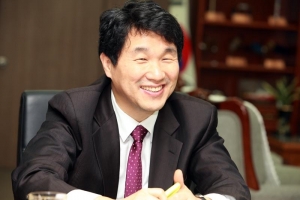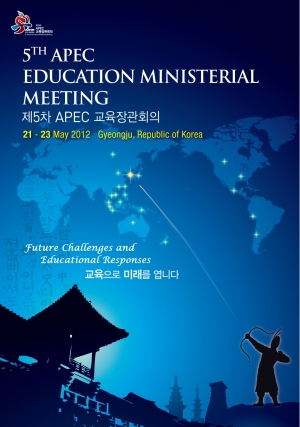
SEOUL, KOREA - "Korea will host the fifth APEC Education Ministerial Meeting in Gyeongju from May 21-23, the Minister of Education, Science and Technology," Lee Ju-ho has said.
"Held once every four years, the event is one of the most important cabinet-level international meetings focused on education. Throughout the course of the event education ministers and experts from 21 Asia and Pacific-basin countries will gather to discuss the role of education for creative growth and seek ways to foster talents," Minister Lee said.
In an interview with Korea IT Times, he said, "The APEC meeting is one of the largest education events to be held in Korea. By hosting a meeting of this caliber, Korea is expected to become a leader in vitalizing educational cooperation among APEC member countries. This is also another step towards becoming a vital member in the international scene.’’
The event extends an invitation to education ministers and experts from 21 APEC-member countries, including the United States, Canada, Japan, Chile, Peru, Thailand and Vietnam. Korea is the second Asian country to hold the event following Singapore in 2000. The last meeting was held in 2008 in Peru. The United States and Chile hosted the meeting in 1992 and 2004, respectively.
"Under the topic of 'future challenges and educational responses: fostering global, innovative and cooperative education,' participants in the event shall seek educational means to effectively cope with a variety of challenging tasks of the future as the acceleration of the global economy and technology innovation, and global environmental change, while seeking a method to build a global cooperative system," he said.
Along with this, they are expected to focus their discussions on future technology and how to foster abilities suitable for knowledge-based society, a delivery system for innovative education for students and ways to improve the quality of teachers. "Most of all, the first priority will be placed on the importance of cooperation among APEC countries at the 5th APEC Education Ministerial Meeting. On this note, we have established a discussion structure to strengthen educational cooperation in the APEC region," he added.
Education ministers seek harmony among core APEC issues
Education ministers from 21 APEC countries will seek harmony among core APEC issues, including globalization, innovation and cooperation, at the Gyeongju meeting, a spokesman for the Ministry of Education, Science and Technology said. Among major topics to be discussed at the meeting are mathematics, science, language, foreign language, job, technology and Information and Communication Technology (ICT) education.
"In particular, participants in the meeting are aiming to link technology and ICT, strong points within Korea, and the above topics in order to produce effective discussion results," he said. "As the host of the APEC meeting, Korea plans to adopt the 'Gyeongju Declaration,' a detailed action plan to lead major issues, including educational cooperation among APEC member countries," said the spokesman.
Russia, Peru, China and the Philippines are expected to lead the initiative in discussing the topic of "globalization: preparing students with future skills to be college and career ready" at the three-day education ministerial meeting. Their discussions is focused on education in the fields of mathematics, science, language and multi-culture, as well as vocational and technology education and quality of high-level education.
Meanwhile, Korea, Vietnam, the United States and Chile will lead discussions on "innovation: creating learning systems that challenge students via educational technology." They engage in in-depth discussions on technology in education, ICT, and teacher systems. "Under the topic of 'cooperation: education for sustainable development," Korea is proposing an action plan to generate a pragmatic mechanism to carry out topics related to the APEC education ministerial meeting, while making the "Gyeongju Declaration," he said.
Various side events of Gyeongju APEC meeting

A variety of side events for the APEC education ministerial meeting have been prepared, including the future class theme hall, APEC member countries' education PR hall, a global forum, an on-the-spot visit to excellent schools, and a culture tour, the spokesman said.
The future class theme hall is the future-oriented class experience hall, designed to showcase the vision of future education and the role of future schools by utilizing e-learning, smart learning and digital textbooks.
"Visitors will be able to gain knowledge of education systems, education polices and the ideal education cases of 21 countries through the APEC member countries' education PR hall," explained the spokesman.
At the global forum, renowned scholars, including Vicky Phillips, director of education at the Bill & Melinda Gates Foundation, Melbourne Graduate School of Education Prof. Patrick Griffin, and Kang Hye-ryun, president of the Korea Foundation for the Advancement of Science and Technology, will deliver presentations on creative humanism education, smart learning and Korea's education policies.
The future class theme hall and the APEC member countries' education PR hall are scheduled to be open to the public on May 24.
"At the same time, APEC education ministers and experts can learn about Korea's excellent education achievements, including smart learning, mathematics & science education and meister high schools through the on-the-spot visit to excellent schools program," he said.
There are three courses available to visit. - The first course covers Weolseong Primary School (smart learning), Gyeongju High School (subject class system), Cheomseongdae (the oldest observatory in East Asia) and Bulguksa (the most famous Buddhist temple in Korea). The second course will connect Hwangnam Primary School (mathematics & science education), Cheomseongdae, Wharang Middle School (smart learning) and Bulguksa. Finally, the third course visits Pohang Jecheol Technical High School (Meister school), Pohang University of Science and Technology and POSCO. "Through various side events, the ministry plans to herald Korea's rapid developments in education to APEC education ministers and experts and strengthen educational cooperation between member countries," he said.
Future class theme hall
The ministry spokesman stated that ICT has played a very important role in Korea's education. "For instance, we established extremely fast Internet networks at primary and middles schools across the country to enhance learning effectiveness through classes by using ICT. This technology has greatly contributed to narrowing the educational gap between students," he said.
The number of cyber classes available for studying at home increased from 46,882 in 2009 to 67,356 in 2011 and that of classes equipped with IPTV soared from 31,128 in 2010 to 45,045 in 2011. In the meantime, the utilization rate of the state-run television network EBS' education program went up from 70.4% in 2008 to 72.5% in 2010, further increasing to 74.3% in 2011. "The vision of smart learning is to foster global talents armed with creativity and human nature, who will lead the global village moving forward," he said.
Noting that it is difficult to effectively cope with future society with uniform and spoon-feeding education, he said, "The ministry is creating an environment which can deliver diverse knowledge through smart learning, while offering tailor-made learning to individual students. By doing so, we aim to increase interaction between teachers and students as well as between students themselves.
"We expect children who grow up in the smart learning environment to strengthen their abilities in creativity, problem solutions, communications and cooperative work," said the spokesman. "To achieve the goal of introducing smart learning in earnest in 2015, the ministry plans to develop and supply digital textbooks which combine existing textbooks and reference books and utilize affluent educational resources to schools," he said.
The ministry plans to add such learning reference materials as dictionaries, appraisal items, multimedia materials, learning assistance, and management functions to existing textbooks in order to maximize the effectiveness of digital textbooks. Students can take advantage of digital textbooks by using a variety of smart equipment, including general PCs based on cloud computing environments.
"To help students use educational contents more freely in a safe environment, the ministry is putting its best efforts into securing various contents for education and revamping the Copyright Law," said the spokesman. "Through smart learning, we hope to provide learning opportunities to students who lost learning chances owing to institutional, geographical and individual reasons in a bid to narrow the educational gaps between students nationwide," he said. To generate model development of smart learning and to enhance its recognition, the ministry is also moving to cooperate with private companies to carry out a program to teach smart learning methods to teachers and build a cloud-based educational service environment, he noted.
Korea is attempting to contribute to global society by sharing its rich experiences and expertise accumulated in the course of propelling smart learning with foreign countries. "Along these lines, the ministry will prepare a place for discussion related to smart learning among APEC education ministers at this time, sharing Korea's experience and know-how," he said.
Past performance of APEC Education Ministerial Meetings
The first APEC Education Ministerial Meeting was held in Washington, the United States in 1992 under the topic of "preparation for educational standards in the 21st century" as a means of pursuing productive and satisfied living. Under the subject of "education for learning society in the 21st century," Singapore hosted the second APEC Education Ministerial Meeting in 2000 with the goal of improving the economy and social welfare through education suitable for the millennium era.
The third APEC Education Ministerial Meeting was held in 2004 in Santiago, Chile under the theme "technology improvement to solve challenging tasks in future education" in an attempt to expand economic unity, availability and prosperity by strengthening joint plans.
Peru hosted the fourth APEC Education Ministerial Meeting in 2008 in Lima under the topic of "quality education for all: achieving competencies and skills for the 21st century" as part of its efforts to narrow the economic gap among Asia and Pacific-basin countries via quality improvement of education.
Smart Learning plans six-part series
1. What is Smart Learning
- Along with e-Learning and Cloud Computing, Comes the Advancement of Smart Learning(Published)
2. Smart Education Scheme and the Model; Charmsaem Elementary School
- ‘KERIS’s Smart Education Scheme’ (Published)
3. Smart Learning business model
- The best Time for Korea's e-learning Companies to Show Korean-type Smart Learning(Published)
- 4CSoft – Innovative and Advanced Smart e-Learning solutions(Published)
4. Smart Learning models, Smart Education Polices (MEST) and industry-specific Smart Learning Approaches
-Korea Hosts 5th APEC Education Ministerial Meeting in Gyeongju in May
5. The future of smart learning depends on contents
- EBS’s Education Contents Go Global by Google(Published)
6. Build a cloud-computing environment


